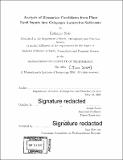| dc.contributor.advisor | Julian Sachs. | en_US |
| dc.contributor.author | Ricke, Katharine (Katharine Leigh) | en_US |
| dc.contributor.other | Massachusetts Institute of Technology. Department of Earth, Atmospheric, and Planetary Sciences. | en_US |
| dc.date.accessioned | 2018-03-27T14:17:19Z | |
| dc.date.available | 2018-03-27T14:17:19Z | |
| dc.date.copyright | 2004 | en_US |
| dc.date.issued | 2004 | en_US |
| dc.identifier.uri | http://hdl.handle.net/1721.1/114319 | |
| dc.description | Thesis: S.B., Massachusetts Institute of Technology, Department of Earth, Atmospheric, and Planetary Sciences, 2004. | en_US |
| dc.description | Cataloged from PDF version of thesis. | en_US |
| dc.description | Includes bibliographical references (pages 55-57). | en_US |
| dc.description.abstract | Paleoclimatological investigations into past precipitation and temperature patterns in regions of the tropical Pacific may be the key to resolving scientific disputes about the effects of global warming on the magnitude and frequency of the El Niño/Southern Oscillation (ENSO) phenomenon. Plant lipids identified in the sediment record of lakes in regions of high ENSO activity can act as biomarkers to reconstruct past precipitation patterns by measuring the D/H ratios preserved in these compounds to observe the local climate changes with global temperature variations. Twelve plant species and two sediment samples from in and around El Junco lake catchmernt on Sari Cristobal in the Galapagos Islands were solvent extracted, identified and quantified using gas chromatography arid mass spectrometry. The analysis revealed evidence for significant aquatic and terrestrial vascular plant inputs to lake sediments. High concentrations of unsaturated C₁₆ and C₁₈ fatty acids were found in all plant samples, but these compounds appear to be degraded significantly in the sediment record. n-Alkane distributions suggest a strong hydrocarbon contribution from submerged and floating plants. Additionally, a terrestrial biomarker, fernene, was identified. The information in this study should be a helpful guide for further biomarker identification efforts at the El Junco lake and in other tropical crater lakes. | en_US |
| dc.description.statementofresponsibility | by Katharine Ricke. | en_US |
| dc.format.extent | 57 pages | en_US |
| dc.language.iso | eng | en_US |
| dc.publisher | Massachusetts Institute of Technology | en_US |
| dc.rights | MIT theses are protected by copyright. They may be viewed, downloaded, or printed from this source but further reproduction or distribution in any format is prohibited without written permission. | en_US |
| dc.rights.uri | http://dspace.mit.edu/handle/1721.1/7582 | en_US |
| dc.subject | Earth, Atmospheric, and Planetary Sciences. | en_US |
| dc.title | Analysis of biomarker candidates from plant lipid inputs into Galapagos lacustrine sediments | en_US |
| dc.type | Thesis | en_US |
| dc.description.degree | S.B. | en_US |
| dc.contributor.department | Massachusetts Institute of Technology. Department of Earth, Atmospheric, and Planetary Sciences | |
| dc.identifier.oclc | 1028737923 | en_US |
